The horses of an Argentine polo club may look normal, but the way they came into existence is anything but conventional
You don’t expect to hear that some of the most cutting-edge biotechnology is now part of the elite game of polo, “the ancient sport of kings.”
But on a trip to Argentina last December, we went to a big polo match — and discovered that several of the champion horses on the field were clones.
It’s a big day in Buenos Aires — the final match in this year’s World Cup/Super Bowl of polo called the Argentine Open – with the usual pageantry, the tango included. In polo, the horses, called ponies, are just as important as their riders.
The two teams are La Dolfina in white and Ellerstina in black.
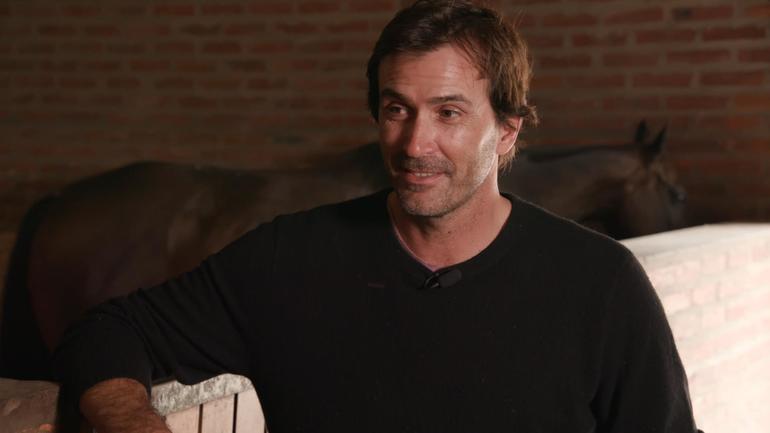
Adolfo Cambiaso
Each team has four players who ride as many as a dozen horses during matches. All of the players today have reached the highest ranking in the sport – a 10 goal handicap.
The player generating the most interest is the man in the blue and white helmet, Adolfo Cambiaso. He’s led his team to victory for the last five years. At 42, he’s the Tom Brady of polo.
Adolfo Cambiaso: I love the sport that I do. I love polo. I love horses. And so I try to be the best.
Lesley Stahl: You are number one in the world in your sport. That’s stunning, isn’t it?
Adolfo Cambiaso: It’s strange. When they say it to you, you don’t feel like it but…
Lesley Stahl: How long have you had this title? How many years?
Adolfo Cambiaso: For 22 years.
Lesley Stahl: You’ve been the best in the world for 22 years?
Adolfo Cambiaso: That’s what they say.
At age 25, Adolfo decided to create his own polo team called La Dolfina, and a breeding business from scratch. Today he has nearly a 1000 horses that are fed a special diet of plants and grasses grown on his massive farms.
Adolfo Cambiaso: If they have a little pain somewhere I dig a swimming pool for them just to swim.
A swimming pool for the horses, where they do laps and stretch out their sore muscles.
Lesley Stahl: And they like it?
Adolfo Cambiaso: They love it.
Lesley Stahl: They do? They like to–
Adolfo Cambiaso: They love it. They jump on. It’s amazing.
His most prized horse for a long time was named Aiken Cura. But at the Argentine Open 12 years ago, Aiken Cura’s leg was broken. And Adolfo was devastated.
Adolfo Cambiaso: More than anything, I say, “Save this horse.”
Lesley Stahl: He was your favorite–
Adolfo Cambiaso: Yes.
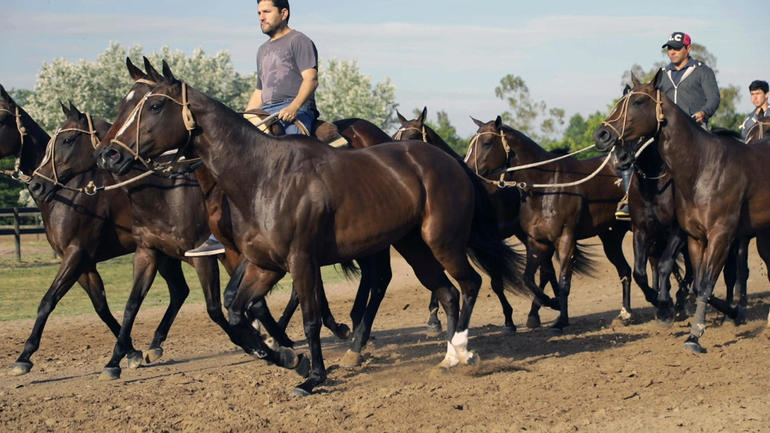
But the horse could not be saved. Before they put him down, Adolfo made a fateful decision: he asked his veterinarian to save some of the horse’s skin cells. He thought that one day he could bring Aiken Cura back to life through cloning.
Adolfo Cambiaso: I was really sad and I say cloning should work —
Lesley Stahl: How did that come into your head?
Adolfo Cambiaso: I don’t know. I decided to keep some cells from him, just in case years later– cloning– is normal.
He remembered Dolly the sheep, the first cloned mammal. Since then, scientists have cloned cows, pigs, goats, and in 2003, the first horse.
Biologist Adrian Mutto, one of the first scientists to clone in Argentina, showed us the process: he starts with an egg extracted minutes earlier from a mare.
Dr. Adrian Mutto: You can see here, this is an egg. And with that needle, we eliminate all DNA of each egg.
Next, he replaces it with the DNA of the horse they want to clone.
Dr. Adrian Mutto: The next step is introduce again into the, into the egg the needle. This is the DNA into the egg.
Lesley Stahl: You did it?
Dr. Adrian Mutto: Yeah This is our cell and this is the egg.
Lesley Stahl: And that’s it.
Dr. Adrian Mutto: That’s it.
The new embryos are then incubated for one week. No sperm has been involved.
Dr. Adrian Mutto: We don’t need the sperm.
Lesley Stahl: There’s no male–
Dr. Adrian Mutto: Yes. Yes, no male here. Only me.
Lesley Stahl: But– but that’s incredible. The– there– it’s– so it’s not a male-female reproduction at all.
Dr. Adrian Mutto: Yes.
Lesley Stahl: You’re just taking a cell from whichever. Could be a mare or could be a male horse–
Dr. Adrian Mutto: Yes.
Lesley Stahl: And you’re putting it in this egg–
Dr. Adrian Mutto: The cell, into the egg.
Lesley Stahl: No sex at all?
Dr. Adrian Mutto: And– we, no. Poor horses.
The incubated egg is implanted in a surrogate mare who gives birth to the clone –- like this one that’s 3 weeks old.
Cloning represented a business opportunity to this man, Texas oil heir and polo enthusiast Alan Meeker. He had long dreamt of building a fleet of champion horses, and now had a way to do it.
Alan Meeker: I did some short math and I realized it would take 50 years and about $100 million to do what I wanted to do. And I thought, “Well, why don’t I just clone a bunch of horses, really, really good horses.
In 2009, Meeker founded a horse-cloning business and, a year later, licensed the technology that was used to clone Dolly the sheep.
Alan Meeker: “Okay, now– now I need to find the best horses.” So I put together an idea of licensing the genetics from the very best– breeders in polo. I knew some people that knew Adolpho.
Lesley Stahl: Was he considered one of the best breeders? Not just the best players, but also one of the best breeders?
Alan Meeker: Breeders and owners of horses. His horses were performing better than anyone else.
Lesley Stahl: When Alan first approached you about cloning?
Adolfo Cambiaso: And I say yes the first day.
Lesley Stahl: Immediately.
Adolfo Cambiaso: Yes.
Lesley Stahl: And, “Guess what,” you said, “Alan, guess what I have”?
Adolfo Cambiaso: Yeah. I wanna tell him that I have– cells from a horse that I really loved that I would love to clone.
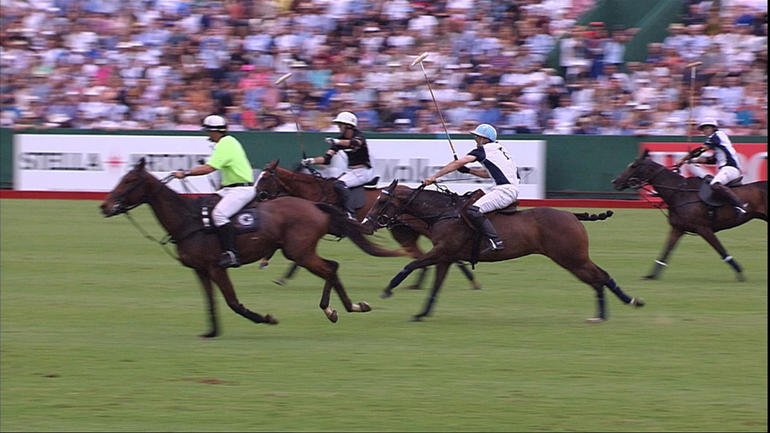
It took a while to get it right – one attempt failed, but after two years, Adolfo got his wish. The birth of a clone of his beloved Aiken Cura who grew into this magnificent, healthy horse, almost exactly like the original in strength, athletic ability and temperament.
Adolfo Cambiaso: When I saw him, I couldn’t believe it.
Lesley Stahl: Did you know by just looking– and of course it was a little foal at that point–
Adolfo Cambiaso: Yes. It was. But…
Lesley Stahl: You could tell?
Adolfo Cambiaso: To make sure, I took some hair from him, and I bring him back to Argentina to do the DNA.
Lesley Stahl: To double-check.
Adolfo Cambiaso: To double-check it was him.
At the same time, he decided to clone another horse — his biggest star -– a mare called Cuartetera.
Now 17 years old, the original has been playing polo since she was 4 – a year younger than most polo ponies – simply because she took to the game so quickly.
Adolfo Cambiaso: I think she’s born to play, you know? There is those horses in life or like soccer players like Messi. It’s not many.
Lesley Stahl: Like you.
Adolfo Cambiaso: No. I don’t know. No. But what I’m saying, this horse is amazing.
He took us to the barn where Cuartetera lives with eight of her clones.
Adolfo Cambiaso: You see those– these two little points–
Lesley Stahl: Yeah.
Adolfo Cambiaso: From this little point is where you make all these horses.
Lesley Stahl: This is where they took the cells—
Adolfo Cambiaso: Exactly.
Lesley Stahl: –to make the other–
Adolfo Cambiaso: To make the other. Because of her you get all these ones.
Lesley Stahl: And that was what you were thinking?
Adolfo Cambiaso: Yes.
Lesley Stahl: “I’m gonna”–
Adolfo Cambiaso: That was my dream but everybody was–
Lesley Stahl: –“clone the best.”
Adolfo Cambiaso: –saying that I was crazy. And I like it right now because I’m having a good time hearing those people.
Lesley Stahl: Yeah, they’re saying, “He’s not so crazy anymore”-
And look what he’s done: in seven years, he and his partners have created more than a dozen clones of Cuartetera.
Dr. Adrian Mutto: It’s incredible for me. I never lose my, wow, this is– my production. This is my equine daughter.
Dr. Mutto, who was hired as the lead scientist in Adolfo’s cloning business, took us to see the Cuartetera clones he thinks of as his children.
Dr. Adrian Mutto: This is– Cuartetera number five.
Lesley Stahl: Oh my God.
Dr. Adrian Mutto: This is number four. Number three. Number nine.
Lesley Stahl: Oh my God.
Dr. Adrian Mutto: Number six.
Lesley Stahl: You can tell which one.
Dr. Adrian Mutto: Yeah, be–
Lesley Stahl: You’re not reading anything–
Dr. Adrian Mutto: –because I know her by the– but– they are– are all clones.
Dr. Adrian Mutto: Yes. Right now, we have 14.
Lesley Stahl: Just from Cuartetera?
Dr. Adrian Mutto: 14, and next year, 10 more. And 2019, 10 more.
In all, there are more than 100 clones from several of their best horses. In each case, he said the clones are strikingly similar to the originals in disposition, athletic ability and appearance. But not exactly. For example, the Cuartetera clones all have white markings, but with different shapes and in different places, some on the face; some on the ankle.
But all the Cuarteteras seem to have inherited the original’s calm, self-contained personality.
Lesley Stahl: So the genetics include this temperament?
Adolfo Cambiaso: Yes.
Lesley Stahl: And do the clones get along with each other?
Adolfo Cambiaso: Yeah, because they live together all year long. So– from here, they go to the farm together, then they move in blocks. If you take one out of them, they are looking for it.
Lesley Stahl: They miss the one that you take out.
Adolfo Cambiaso: Yeah.
Lesley Stahl: Did the clones have any special health issues?
Adolfo Cambiaso: No.
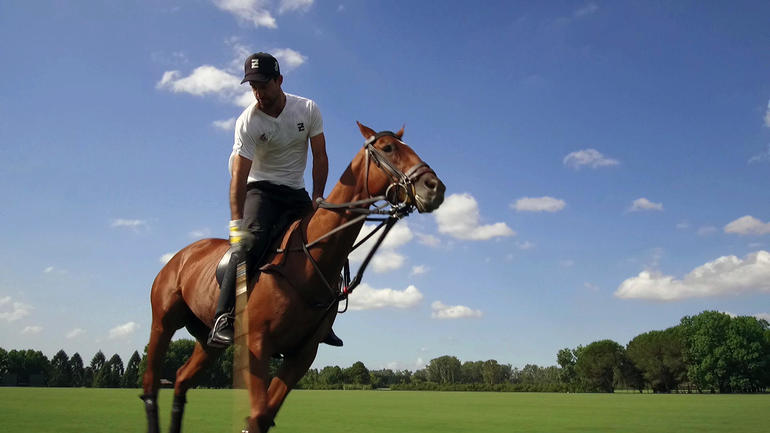
We talked to scientists at the National Institute of Health and were told there is no evidence that cloned animals suffer disproportionate health problems, though they have a slightly higher infant mortality rate. At first, many of Adolfo’s cloned embryos died during gestation. But they refined their technique and now tell us they have an 85 percent successful birth rate and have not experienced any health problems.
Lesley Stahl: So as far as you are thinking, they’re exactly the same in health, longevity.
Adolfo Cambiaso: Si.
Lesley Stahl: Ability to play the game, all of it.
Adolfo Cambiaso: Similar. Similar. Not exactly the same…
Lesley Stahl: What are the differences?
Adolfo Cambiaso: There is some that are a little bigger. Some eat more, some eat less. Or they move a little bit different. But the mind are really similar. The good thing about it, they are machines, all of them.
Machines -– that’s polo talk for horses that never quit.
But how would they perform in competition? At the final at the Argentine Open, Adolfo gambled that his Cuartetera clones would be as good as the original and, for the first time, he rode them almost exclusively.
Regulators of thoroughbred horse racing worldwide have taken a firm stand against cloning. But there is no such prohibition in polo and so cloning is spreading to teams beyond Adolfo Cambiaso’s. It raises some thorny questions: does cloning give a team an unfair advantage? Is it ethical? And where will it lead?
In December, at the final match of the Argentine Open in Buenos Aires, one team rode clones while the other refused to. The competition was as much about the merits of cloning as it was a sporting contest.
Out of more than 850 professional polo players, Argentine native Adolfo Cambiaso – wearing the blue and white helmet and the jersey marked number one, is the best player in the world. He’s held that ranking for 22 years and is now leading a cloning revolution. He’s cloning his best horses; the one he’s riding is a clone. He’s competing on them – and winning.
Lesley Stahl: When you’re on one of the clones playing, is there a special feeling? Knowing that h– you know, this is something that was your idea, you brought it to life–
Adolfo Cambiaso: Yeah. In this stage of my career– the last couple of years for me to play and prove that the clone works and play with Cuarteteras and everything is an extra motivation for myself, for sure.
Lesley Stahl: I don’t know that you need extra motivation.
Adolfo Cambiaso: Yeah, I do. I do.
He’s created 14 clones of Cuartetera, his very best horse – a 17-year-old mare who is fast, easy to direct and can turn on a dime. She was honored last year as the best polo horse in history. Her clones seem to be just as gifted.
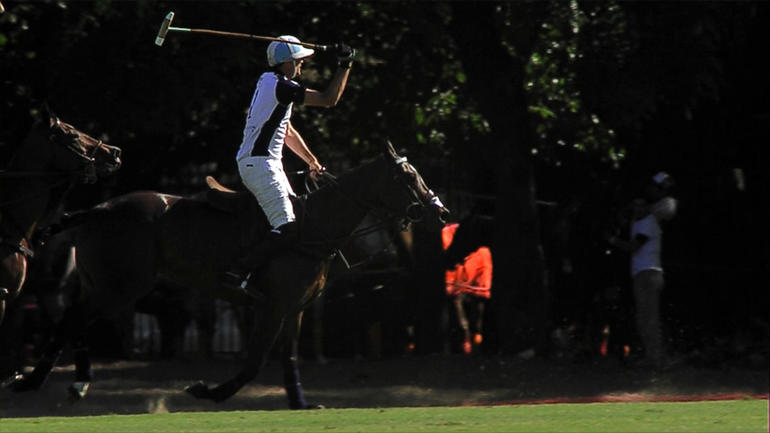
Lesley Stahl: Are they all as good – I want to call her Mama. I don’t–- That’s probably not the right word.
Adolfo Cambiaso: The original. Yeah.
Lesley Stahl: Are they as good?
Adolfo Cambiaso: I already won two Argentine Opens with the clones. So they will end up being as good as her I think.
Cuartetera’s clones are identified by numbers.
Lesley Stahl: Shouldn’t they have names?
Adolfo Cambiaso: They have names.
Lesley Stahl: Well, they don’t.
Adolfo Cambiaso: Cuartetera.
Lesley Stahl: Yeah, but– m–
Adolfo Cambiaso: Cuartetera one, two, three, four–
Lesley Stahl: Was that your idea?
Adolfo Cambiaso: Yes. Because I– I believe that she is a Cuartetera. All of the ones that I ride, they are Cuarteteras.
Lesley Stahl: So you actually think–
Adolfo Cambiaso: She’s Cuartetera when I play.
Lesley Stahl: When you’re– so six is Cuartetera, is–
Adolfo Cambiaso: Is Cuartetera.
Lesley Stahl: And when you’re on nine, it’s the same thing?
Adolfo Cambiaso: Cuartetera.
Lesley Stahl: But she’s an individual.
Adolfo Cambiaso: Yes. But the DN– DNA, it’s a Cuartetera.
Lesley Stahl: But when you have identical twins, they each get a name.
Adolfo Cambiaso: But this is not twins, it’s a clone.
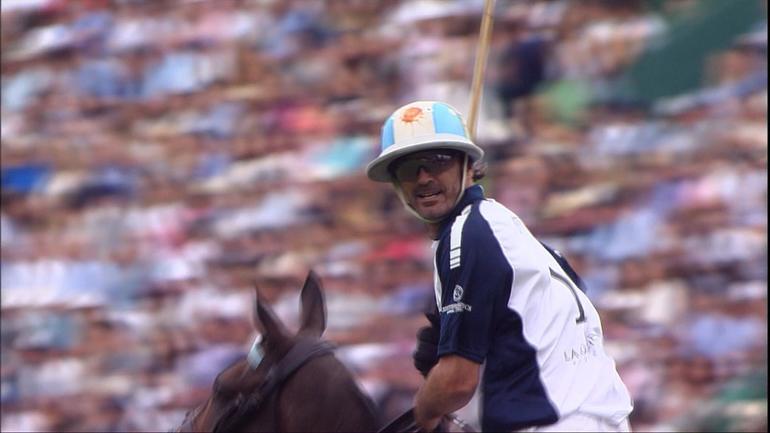
They can now create 100 clones a year and they’re using them in Adolfo’s already successful breeding business. They mate the clones with champion horses and sell their foals for up to $250,000. But they never sell the clones.
Adolfo Cambiaso: You sell the clone, you sell the blood, you sell the line, you sell the DNA, you sell everything if you sell a clone.
Ernesto Gutierrez: We keep the key of the genetics and this was, I think, the good business to make that decision in the past.
The idea of never selling the clones came from Ernesto Gutierrez, a shrewd Argentine businessman, who became a third partner in the cloning venture. The cloning operation was set up here on his 500-acre property outside Buenos Aires that includes three polo fields, and a nursery where the clones are born. They are carried by surrogate mares who treat them like their own.
Lesley Stahl: Are these all cloned babies in here?
Ernesto Gutierrez: All cloned babies? Yeah.
Lesley Stahl: And these are the surrogate mothers? And does the mother think it’s totally her baby?
Ernesto Gutierrez: Totally, totally. Look at that.
Gutierrez took us back to see the newest one – that 3-week-old clone of Cuartetera who has her own nurse.
Lesley Stahl: Oh, look how sweet. And frisky. Oh, look at that, oh my.
Not everyone in polo thinks cloning is a good idea – including Adolfo Cambiaso’s main rival and opponent at the final of the Argentine Open.
Facundo Pieres: There’s a lot of guys cloning. But I think that they have to be careful, you know because, the thing is that they’re opening too much, you know? I mean–
Lesley Stahl: Pandora’s Box. You know what that means? They let– opened the lid. And all the problems come out—
Facundo Pieres: Exactly.
Facundo Pieres is number two in the world, right behind Adolfo. He showed us what he can do, like dribble a three-inch ball in the air while galloping down the field 20 miles an hour. He’s the captain of Ellerstina, an old-school team made up of three brothers and a cousin. They are committed to keeping it a family enterprise.
Lesley Stahl: Do you ever get angry at each other?
Facundo Pieres: Yes. Yes, but in a good way. Never– never bad.
His team is headquartered at another sprawling estate where they operate a multi-million dollar breeding business selling foals and embryos. They believe they can produce better horses through their breeding practices – by mixing the DNA of two different horses, rather than by replicating just one.
Facundo Pieres: We wanna keep it this way. What we have here is amazing
Lesley Stahl: In polo, what’s more important, the horse or the player? I was told that it’s 80 percent the horse. Sorry–
Facundo Pieres: Yes, I– I agree. No–
Lesley Stahl: No offense.
Facundo Pieres: No, I agree. I agree. I totally agree. I think that the horse is. But of course, you need to have a little bit of– of talent and ability and– and experience in the head, you know?
Facundo’s team – Ellerstina – has made it to the finals the last 4 years, but lost each time to Adolfo Cambiaso’s team. Fueling the rivalry on the field is a bitter history between them: Adolfo played on the Ellerstina team for 9 years.
Adolfo Cambiaso: Because of what happened, that I left Ellerstina and the rivalry is there–
Lesley Stahl: Intense.
Adolfo Cambiaso: Yeah.
Lesley Stahl: To this minute.
Adolfo Cambiaso: Yeah.
Lesley Stahl: Do you feel it too?
Adolfo Cambiaso: But it’s fun.
Lesley Stahl: Oh, you like it–
Adolfo Cambiaso: You gotta have rivalry to be better player too.
There’s more. Before he left Ellerstina, Adolfo bought Cuartetera, as an embryo, from the Pieres family… the very horse he is now cloning to compete against them.
Adolfo Cambiaso: I was lucky to end up with Cuartetera.
Lesley Stahl: You cloned from the best horse in the world.
Adolfo Cambiaso: But she’s born on my farm. I create her.
Lesley Stahl: There are people who object to cloning on religious grounds… Or on moral grounds. So what is the answer when people challenge you? When they say, ‘Man should not be doing this’ because of these difficult spiritual questions?
Adolfo Cambiaso: I don’t see it, I don’t see it wrong, to be honest. I’m just– doing something for– to improve my game, my sport. And I think the Cuateteras did improve my game, my sport. And I’m not going farther than that.
Lesley Stahl: But, is there an unfair advantage in terms of the game, in terms of the sport?
Adolfo Cambiaso: No, because everybody’s able to clone. Now everybody’s kind of trying to start cloning. So the advantage is that I did it seven years ago.
Lesley Stahl: So in 30 years, people will still be riding Cuartetera?
Adolfo Cambiaso: Yes.
Lesley Stahl: And so it could go on forever.
Adolfo Cambiaso: Yes. Yes.
Alan Meeker, the Texas businessman who is Adolfo’s cloning partner, is well aware of the controversy around cloning technology in the U.S. and the ban against it in thoroughbred horse racing.
Lesley Stahl: Is a really good polo player– does he have– an unfair advantage if he’s on a clone of one of the best– polo horses ever?
Alan Meeker: Of course. Horses are 80 percent of the game anyway. So if Facundo Pieres finds a horse that is better than Cuartetera than he has an advantage over his competitor.
Lesley Stahl: But he’ll have only one. And that horse will get tired, and he’ll have to switch to another horse in the game, whereas Adolfo will have 8.
Alan Meeker: Right.
Lesley Stahl: So it’s still an advantage.
Alan Meeker: Right.
Lesley Stahl: Is that fair?
Alan Meeker: Under the rules it’s fair. There’s no restriction on…
Lesley Stahl: I know but the game — but sportsmanship, just the nature of the game. Has this changed the very essence of the game of polo?
Alan Meeker: No. I think what it’s done is probably raise the bar.
Lesley Stahl: You’re going to have to clone.
Alan Meeker: Could be. Yes.
Lesley Stahl: Do you have any moral problems with cloning a human being?
Alan Meeker: Yes. I disagree with it. I know a good reason, lots of good reasons to clone– body parts, like hearts and lungs and pancreases, if it could be done in a productive manner, that can save lives. But I’ve been asked by some of the wealthiest people on planet earth to clone a human being and we–
Lesley Stahl: You have?
Alan Meeker: Absolutely.
Alan Meeker: And the answer is always– a resounding “no.”
Lesley Stahl: Well, they must have a reason.
Alan Meeker: And they won’t give it to me.
Lesley Stahl: They don’t tell you why?
Alan Meeker: No.
Lesley Stahl: I’m thinking if science can do it, science will do it and maybe one day, you know, they’ll be clones and we’ll laugh at all the people who were questioning the morality of it now.
Alan Meeker: Someday someone will do it–
Lesley Stahl: Yes.
Alan Meeker: And we will either laugh or we will cry. But I’m not gonna be the one to take that– that leap.
Lesley Stahl: It could be done today.
Alan Meeker: Yes.
Lesley Stahl: I assumed there’d be a big difference between a horse and a human. Lots of differences.
Alan Meeker: Surprisingly little. Yeah. Surprisingly little.
At the final match at the Argentine open, Adolfo’s team and the clones were expected to win, but seven minutes in, Facundo’s team was ahead, three goals to one.
Adolfo’s team fought back; at halftime, the score was, the cloners, 7; the breeders, 6. It was so tense that at times it was as quiet as a tennis match.
The end of the game was thrilling: as expected, Adolfo’s team was ahead, 13 to 10, but then Facundo’s team in a final blast came back to tie the match.
Adolfo Cambiaso: I never think I’m– I gonna lose. I never.
Lesley Stahl: Well, we saw you right before the overtime.
Adolfo Cambiaso: Yeah.
Lesley Stahl: And here you are. Like that.
Adolfo Cambiaso: In that moment, I was trying to think, “Which is the best horse for that moment?”
He debated, should it be Cuartetera 9? Or 5? Finally he picked number 6.
In the first minute of the sudden death overtime, Facundo’s team lost control of the ball.
Adolfo’s team recovered and Adolfo on his mighty Cuartetera 6 outran everyone and whacked the ball setting up the winning shot.
Watching, you had to wonder: was it the clones or the world’s best player that made the difference?
Produced by Sarah Koch, Nieves Zuberbühler and Terry Manning. Associate producer, Chrissy Jones.
